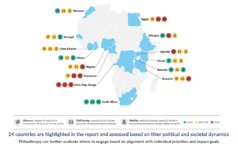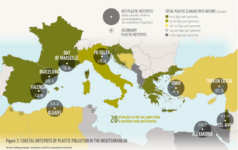A little known marine mammal found in northwest Mexico has been gaining global press attention for weeks now – and for good reason. The vaquita – a small porpoise known as the “panda of the sea” due to the distinctive black circles around its eyes – is on the verge of extinction. With less than 30 vaquitas left in the wild, a new Dalberg authored report for WWF finds that the vaquita could become extinct by the middle of 2018, without immediate action to curb illegal fishing and wildlife trafficking.
The vaquita population has been decimated in recent years, falling by 90% since 2011. The vaquitas’ decline has been accelerated by the world’s growing demand for fish which has led to increased use of gillnets, among other unsustainable and often illegal fishing practices. Gillnets, which are hung vertically in the sea to catch fish by their gills, have been adopted by fishers to increase their catch size. But gillnets and associated practices hugely increase the unintentional bycatch of other species. In particular, the vaquita has been a bycatch victim of illegal fishing for totoaba – a fish whose swim bladder is highly prized in Asian markets not only for traditional medicine but also as a Chinese delicacy. Despite gillnets being temporarily banned in Mexico in 2015, the decline of the vaquita has continued due to illegal fishing.
The vaquita is the world’s most endangered marine mammal and is found only in the Gulf of California in Mexico. Not only do the vaquitas rely on this area for their very existence, so do many local communities. The area is a hub for tourism, attracting nearly 5 million tourists a year who collectively generate almost US$2 billion in revenue for the local economy. In recognition of its iconic beauty and biodiversity, the Gulf of California has been designated as a protected World Heritage site; one of only six such natural sites in Mexico. The Gulf is also one of the most productive marine breeding grounds on the planet, providing the Mexican fishing industry with more than half of all its fish. But continued illegal and unsustainable fishing is jeopardizing the ability of local communities to sustain their livelihoods through fishing and marine-based tourism.
The temporary ban on gillnets is due to expire at the end of May 2017. A permanent extension of this ban, along with stronger enforcement of the law, is needed to give the vaquita any chance of survival. At the same time, governments must do more to curb the international illegal trade in totoaba. In line with an earlier Dalberg authored report, “Not For Sale: Halting the illegal trade of CITES species from World Heritage sites”, our report calls on the Mexican, US, and Chinese governments to introduce improved safeguards to prevent the trafficking of the endangered totoaba across their borders. Although a proposed ex-situ rescue plan to move a small number of vaquitas to a nearby sanctuary is a useful step in trying to restore vaquita numbers, the threats of illegal fishing and wildlife trafficking must be tackled if we want vaquitas to ever exist safely in the wild again.
Immediate efforts to save the vaquita will be in vain if they are not accompanied by a longer-term plan to conserve the World Heritage site. The Mexican government should work with local communities to encourage more sustainable fishing practices and develop alternative sources of income to ensure the long-term protection of the vaquita, its unique marine habitat, and the livelihoods of the local communities that depend on it. It will be a significant setback for global conservation efforts if we cannot prevent the extinction of endangered species in one of the most protected areas in the world.
















